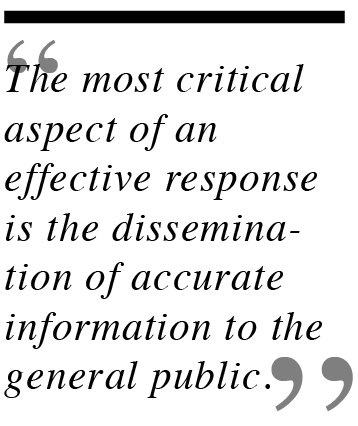The 117th Boston Marathon ended tragically on Monday, as two explosions occurred close to the finish line about two hours after the winners crossed, killing at least three and injuring over 100 people. The causes of the incidents are still unknown, and, despite the nature of the attacks, President Barack Obama was reticent about explicitly calling them acts of terrorism. Professional and amateur journalists alike, however, were quick to spread biased speculations.
When major crises such as these develop, the most critical aspect of an effective response is the dissemination of accurate information to the general public. We are dependent on reputable media sources to broadcast accurate and verified updates. Unfortunately, these basic standards are oftentimes jettisoned in the wake of a disaster, both to expedite the spreading of information and to outdo rival media sources in covering an event being watched by millions around the world.
For example, soon after the Boston blasts, the New York Post reported that a 20-year-old Saudi national was identified as a suspect and arrested for being involved in the attack. The Boston Police Department quickly refuted this erroneous report — but not before the words Muslim and Saudi began trending on Twitter, perpetuating a cycle of confusion among readers and retweeters. MSNBC’s Chris Matthews claimed that domestic terrorists are normally inclined to the political right. Fox News ran its breaking news headline with the insinuation of a Muslim perpetrator, and Fox contributor Erik Rush tweeted, “Yes, [Muslims are] evil. Let’s kill them all.” Whether Rush was joking is irrelevant because his obscene comment reveals a larger issue at hand — the consistent failure of mainstream media to adhere to journalistic standards at times when these standards are most essential.
 To a certain degree, however, the fault inherently lies in digital micro-news media, such as Twitter. When anybody with an account can contribute to such enormous and perpetually shifting discussions, it is not surprising that many of us end up with incorrect information — we are not reporters, but social media allows us to be in moments like these. This is not to disparage the unequivocal importance of instant communication forums, which tend to properly inform us about global events. However, because Facebook and Twitter are everyone’s soapbox, their usefulness is significantly tempered by blatant falsities during major events. This should only serve to reinforce the importance of real journalists reporting real news.
To a certain degree, however, the fault inherently lies in digital micro-news media, such as Twitter. When anybody with an account can contribute to such enormous and perpetually shifting discussions, it is not surprising that many of us end up with incorrect information — we are not reporters, but social media allows us to be in moments like these. This is not to disparage the unequivocal importance of instant communication forums, which tend to properly inform us about global events. However, because Facebook and Twitter are everyone’s soapbox, their usefulness is significantly tempered by blatant falsities during major events. This should only serve to reinforce the importance of real journalists reporting real news.
Highly publicized acts of violence have become more frequent in the American media, and news coverage often only adds fuel to the fire by politicizing and sensationalizing the attacks. Reporters and news sources who resort to irrelevant arguments and speculation without the support of substantiated facts are doing their audiences and, primarily, the victims of senseless violence, a disservice. Rather than focusing on unanswerable questions too soon, we should look to what we already know to be true — this, in the aftermath of disasters such as these, could mean the difference between life and death.
A version of this article appeared in the April 16 print edition. Email the WSN Editorial Board at [email protected].





















































































































































